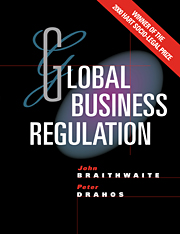4 - Concepts: Mechanisms, Principles and Actors
Published online by Cambridge University Press: 04 August 2020
Summary
The principal thesis of this chapter is that the process of globalization is best conceptualized in terms of the relationships between actors, mechanisms and principles. This thesis is not intended to rival or eclipse other more abstract explanations for globalization since, as our discussion of mechanisms makes clear, we allow for the possibility that the mechanisms we identify as important to globalization can be linked to theories that are more reductive or structural in orientation. Our categories of analysis allow for an interoperability of theory. In brief, this chapter argues that actors use relatively simple or lower-order mechanisms to support those principles that best serve their interests and goals. Principles are presented as abstract prescriptions that precede rule complexity. Other norms, such as guidelines and standards, also feature in global regulation, but understanding conflicts of principles is key, we argue, to understanding regulatory globalization. In the final section we suggest how the analysis of principles and mechanisms helps support our claim (in Chapter 2) that processes of globalization have non-linear dynamics.
Mechanisms
Emphasizing explanation by mechanisms is an approach Jon Elster advocates. Roughly, his argument is that events (which are logically prior to facts) of interest to the social sciences are best explained in terms of causal mechanisms that link those events (Elster 1989). Why do elephants become more endangered after the passage of legislation designed to protect them? A mechanisms explanation might target the rational adaptive behaviour of ivory-hunters. For Elster, a mechanism is not a general law. A general law is conventionally articulated in the form of ‘all As are Bs'. It is general laws that physicists seek and, on one view of the social sciences, what social scientists also seek (Ryan 1973: 4). A knowledge of general laws grounds both explanation and prediction. But in Elster's account the quest for general laws in the social sciences seems one that has only a remote, if any, chance of success. Rarely will social scientists be able ‘to state necessary and sufficient conditions under which the various mechanisms are switched on’ (Elster 1989: 9). What they are more likely to be able to do is identify a causal mechanism that led to an event and thus shed light on why something happened - but why that mechanism rather than another was triggered is likely to remain under a veil.
- Type
- Chapter
- Information
- Global Business Regulation , pp. 15 - 26Publisher: Cambridge University PressPrint publication year: 2000



